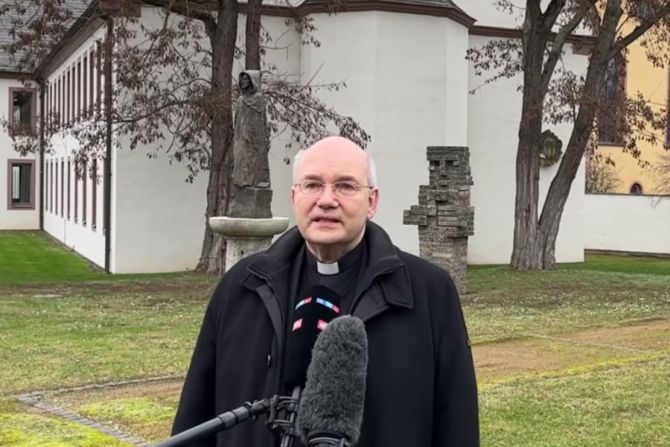German Catholic bishops on Monday welcomed an initiative that is calling for a change in Church teaching on sexuality and gender identity.
The initiative titled “#OutInChurch — For a church without fear,” launched on Jan. 24, appealed for the revision of what it described as “defamatory and outdated” expressions of Catholic doctrine, reported CNA Deutsch, CNA’s German-language news partner.
In a seven-point list of demands, the organizers wrote: “Defamatory and outdated statements of Church doctrine on sexuality and gender need to be revised on the basis of theological and human-scientific findings.”
“This is of utmost relevance especially in view of worldwide Church responsibility for the human rights of LGBTIQ+ persons.”
The campaign — launched with a blaze of publicity in Germany, with an accompanying television program — was welcomed on behalf of the bishops’ conference by Bishop Helmut Dieser, chairman of the “Synodal Way” forum on “Living in Successful Relationships.”
The bishop of Aachen, western Germany, told reporters on Jan. 24 that the Synodal Way — a multi-year process bringing together bishops and lay people to discuss power, sexual morality, the priesthood, and the role of women in the Church — was approaching the issues raised by the initiative in “a new way.”
He said: “No one should be discriminated against, or devalued, or criminalized because of their sexual orientation or gender identity.”
“Because with the Synodal Way, we learn to understand more deeply that sexual orientation and gender identity are part of the person, and we have an image of the human being that tells us that the person is absolutely loved by God, and from this, we approach the topics of sexual orientation, identity, but also sexual fulfillment in a new way with the Synodal Way.”
“And I’m convinced that with the Synodal Way, especially in our forum that deals with these questions, we have the space to respond to these questions in a constructive way, so that precisely what this group that has now shown itself most wants, freedom from fear, is actually achieved.”
He said: “I have respect for the people who confess their sexual orientation in this initiative. A Church in which people have to hide because of their sexual orientation cannot, in my opinion, be in the spirit of Jesus.”
“We are always called to authenticity and transparency before God and, of course, before each other. There must and should be no fear of this.”
He added: “This topic is also being discussed at the Synodal Way of the Catholic Church in Germany. That is where I am participating in the discussion. It should lead to a further development of the Church’s sexual morality and also of the Church’s labor law.”
The initiative is calling for an overhaul of employment laws in the Catholic Church in Germany, the country’s second-largest employer after the state.
“An open life according to one’s sexual orientation and gender identity, even in a partnership or civil marriage, must never be considered a breach of loyalty or a reason for dismissal,” reads one of its demands.
Heße’s comments were echoed by Bishop Franz-Josef Bode of Osnabrück, northwest Germany, who said that he appreciated the campaign as “a courageous step by 125 queer employees of the Catholic Church from all over the country.”
He added that the initiative called for a “long overdue debate” on Church labor law.
“Under labor law, the loyalty of Church employees is closely linked to their lifestyle. Individual arrangements are possible, and these are sought sensitively and to the best of our ability in our diocese,” he said.
“But individual solutions always create uncertainties. It is urgently necessary to find reliable solutions for all sides. The Synodal Way reform process is working on this.”
He said that the topic would be discussed at the next meeting of the Synodal Assembly, the Synodal Way’s supreme decision-making body, on Feb. 3-5.
“The basic message of the Church is God’s unconditional love for all people — in their diversity and uniqueness. This must also apply to all relationships, provided they are based on love and mutual respect,” he commented.
Bishop Heinrich Timmerevers of Dresden-Meißen, eastern Germany, said that he was “very grateful” for the “impressive testimonies” gathered by the campaign.
Several German Catholic associations also expressed their support.
Priests and pastoral workers across Germany defied the Vatican in May 2021 by conducting blessing ceremonies attended by same-sex couples.
Organizers held a day of protest in response to the Congregation for the Doctrine of the Faith’s declaration that the Church does not have the power to bless same-sex unions.
The Vatican statement, issued with the approval of Pope Francis, sparked protests in the German-speaking Catholic world.
Several bishops expressed support for blessings of same-sex couples, while churches displayed LGBT pride flags, and a group of more than 200 theology professors signed a statement criticizing the Vatican.
The Catechism of the Catholic Church says: “The number of men and women who have deep-seated homosexual tendencies is not negligible.”
“This inclination, which is objectively disordered, constitutes for most of them a trial. They must be accepted with respect, compassion, and sensitivity. Every sign of unjust discrimination in their regard should be avoided.”
It adds: “Homosexual persons are called to chastity. By the virtues of self-mastery that teach them inner freedom, at times by the support of disinterested friendship, by prayer and sacramental grace, they can and should gradually and resolutely approach Christian perfection.”

